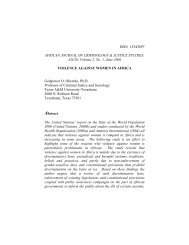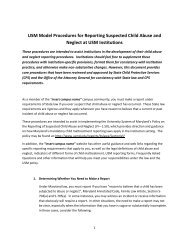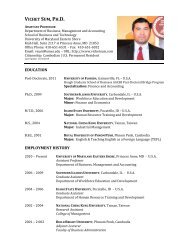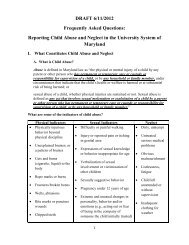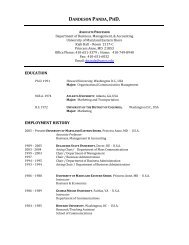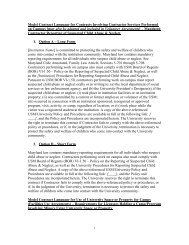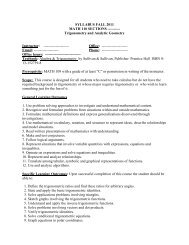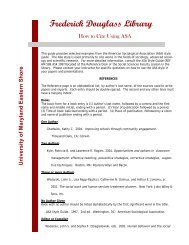Download - University of Maryland Eastern Shore
Download - University of Maryland Eastern Shore
Download - University of Maryland Eastern Shore
You also want an ePaper? Increase the reach of your titles
YUMPU automatically turns print PDFs into web optimized ePapers that Google loves.
A course-embedded assessment is an in class assessment within a course which<br />
measures Pr<strong>of</strong>essional or General Student Outcomes. Existing exercises/assignments or<br />
specifically designed assessments can be used. The assessment must evaluate one or<br />
more pr<strong>of</strong>essional student outcomes using a standardized rubric. Students should have<br />
more than one opportunity to demonstrate competency. Evaluation by more than one<br />
faculty is preferred.<br />
Every module will have at least one CEA. The faculty will identify the Pr<strong>of</strong>essional or<br />
General Student Outcome(s), design the activity, and develop the rubric for evaluating<br />
the activity. The completed and evaluated CEA should be uploaded into the individual<br />
student’s electronic portfolio.<br />
Mentors will periodically check portfolios to verify upload <strong>of</strong> required assignments<br />
End <strong>of</strong> Block Assessments<br />
End <strong>of</strong> block assessments are typically exams given at the end <strong>of</strong> a two-week block. The<br />
content <strong>of</strong> each assessment is proportional to the time spent on a particular subject<br />
during that two-week block. Exams will be focused on assessing the module goals that<br />
are mapped to the Pr<strong>of</strong>essional Student Outcomes.<br />
Individual assessments will be followed with a team assessment using the same<br />
instrument. An additional 5 percentage points will be added to an individual’s<br />
assessment score if his/her team scores at least 95% on the team assessment. A score <strong>of</strong><br />
at least 85% is required to pass the block; a score greater than 95% will be considered<br />
honors. If a student does not achieve a level <strong>of</strong> 85%, then he or she must take a<br />
reassessment on that portion <strong>of</strong> the curriculum at a pre-designated time and achieve a<br />
level <strong>of</strong> 85%. If a student does not successfully achieve the desired set <strong>of</strong> outcomes after<br />
reassessment, they will be required to attend end <strong>of</strong> term extended learning.<br />
PERFORM-Introductory; IPPE Competencies and Ability-Based Outcomes (PERFORM-<br />
Introductory) assessments<br />
Ability-based outcomes are defined as statements describing what students can do as a<br />
result <strong>of</strong> instruction, i.e., their abilities. The student must integrate and apply<br />
knowledge, skills, and attitudes to specific pharmacy-related situations. The PERFORM-<br />
Introductory should reflect the Pr<strong>of</strong>essional or General Student Outcomes used to<br />
develop the curriculum and should progress as the student moves through the<br />
curriculum. Satisfactory demonstration <strong>of</strong> PERFORM-Introductory would indicate that<br />
the student is ready to move on to the advanced practice experiences.<br />
At mid-term and the end <strong>of</strong> each term the preceptors will evaluate students using the<br />
PERFORM-Introductory through an E*Value survey. Students will be evaluated using<br />
pre-defined skill statements; students will be assessed as having performed at the<br />
Highest level (Exceeds expectations and works unsupervised when appropriate),<br />
Satisfactory level (Performs within defined expectations <strong>of</strong> course guidelines with<br />
assistance from preceptor), or Unsatisfactory level (Unable to display behaviors<br />
requiring repeated interventions by the preceptor). The expectation is that each student<br />
will perform most outcomes at a satisfactory level.<br />
Progression Assessments (PCOA)<br />
Progression exams can be used to assess the progress <strong>of</strong> the student as they navigate<br />
through the pr<strong>of</strong>essional program, the effectiveness <strong>of</strong> curriculum delivery, and the<br />
UMES School <strong>of</strong> Pharmacy program compared to other programs. These exams provide<br />
88




